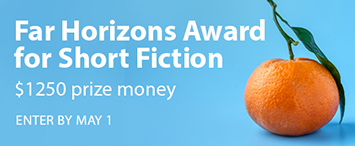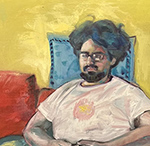Early Bird discount—$10 off!

Calling all emerging writers—this contest is for those who have yet to publish a book of fiction. We've increased the prize this year to CAD $1,250! Plus, if you enter by March 31, you'll get an Early Bird discount of $10 off your initial entry fee.
This year's judge:
Susan Sanford Blades
Early Bird discount entry fee until March 31, 2023 (includes a 1-yr print sub):
$15 CAD for each entry from Canada
$25 CAD for each entry from elsewhere
$15 CAD for each additional entry, no limit
Full contest guidelines on our website.
Khashayar "Kess" Mohammadi, issue #221 poetry contributor
 Volunteer Kara Stanton talks with the winter issue #221 contributor about their poems, "psychotic notebook 9" and "psychotic notebook 20." Volunteer Kara Stanton talks with the winter issue #221 contributor about their poems, "psychotic notebook 9" and "psychotic notebook 20."
KS: Your forthcoming book from Palimpsest Press, fricatives, was co-written with fellow poet Klara du Plessis. What brought you two together in this project, and what has the process of collaboration been like?
KM:
Well, I’ve seen a quite tremendous growth in the number of writing collaborations since the advent of Covid-19. I’ll agree, as someone who used to work 60- to 70-hour weeks for the year or so preceding the lockdown, in the beginning I was quite paralyzed by how much free time I was given, while simultaneously not knowing what on earth to do with myself in all the free time of the first few months.
I have known Klara for years, since the launch of her first book Ekke which I’d still quote as one of my favorite debuts in Canadian literature. I always adored Klara’s intelligence and her linguistic curiosity that was also very grounded and welcoming. I’ve always enjoyed translingual poetry, but I had never come across a translingual book of poetry more enjoyable and welcoming than Ekke. Throughout the years after our first meeting, I proposed for us to work together on a piece, but my first attempt for our collaboration was not successful due to lack of scope on my part.
During the first major lockdown I once again reached out to Klara, this time with an idea: What if we began a project that centered entirely on the fricative X, a consonant that was perhaps a prominent feature of our mother tongues: Afrikaans and Persian.
We began the collaboration with the intention of writing a single poem, which over a week developed into about 20 pages, and over a month and a half, grew more than 50. we continued the project and decided to make a full length book out of it and the process was so utterly electric, so rewarding and challenging that I’ve rarely experienced anything like it.
Read the rest of Khashayar "Kess" Mohammadi's interview.
Barbara Tran, issue #221 fiction contributor
 Managing Editor L'Amour Lisik talks with the winter issue #221 contributor about her story, "Le Loup et le Chien." Managing Editor L'Amour Lisik talks with the winter issue #221 contributor about her story, "Le Loup et le Chien."
LL: There are several seemingly small details in this short story, such as the family dog’s name, King, which implies a certain power or aloofness. That assumption is immediately flipped when we find out how obedient King is: “…Ba would call our German Shepherd, King, to his side (if King wasn’t already there, which he usually was).” Do these details come to you as you write a story, or do they show up later, through the layers of editing that go into a piece of writing?
BT:
The name “King” was a gift from Phạm Xuân Ẩn, who actually did have a German Shepherd by that name. For the reasons you outlined earlier, this detail was too rich to pass up.
For me, small details are paramount and generally come before the arc of the story. Perhaps others who are neurodivergent can relate. I begin with unconnected details and write my way to their connection. It’s like discovering an assortment of odd objects in your pocket. What can you do with these things? How can you connect them? Why has the subconscious connected them?
Read the rest of Barbara Tran's interview as well as an excerpt.
|
|
|
|
|
|
|
|